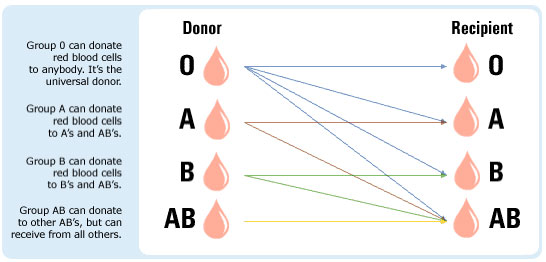Consider a situation where a patient is in the hospital and has surgery. During the surgery there is a complication, resulting in increased bleeding and the need for a transfusion. There is just one problem: the hospital doesn’t have the right blood type to match to the patient. What can be done? Is a hospital legally responsible for any harm that occurs as a result of this lack of blood?
To begin, there are four major blood groups: A, B, AB and O. In each of these groups, the presence of an Rh factor determines if a person is + or -. So there are 8 different blood types all together.
Depending on your blood type, you can accept transfusions safely from other blood types, and other people can accept your blood type safely. For example, if you have Group O blood, you can donate to any other blood group. However, if you have Group AB blood, you can only donate to another person with AB blood.
Further, if you have Rh-negative blood type, you can donate your blood to patients who are either Rh-positive or negative. If you are Rh-positive, you can generally only donate to Rh-positive folks.
Here is a handy chart from the American Red Cross that shows this:

In the United States, hospitals and other health care providers who are responsible for providing blood products to patients must rely on donations of blood. There are Blood Banks where you can go and donate blood, and often there are blood drives set up where mobile buses park and people can donate.
Given that supplies are made by donation only, it can be difficult for hospitals to always have enough blood on hand to handle any possible situation.
So back to the hypothetical above. Certainly, it is possible that the hospital failed to follow its own policies and procedures regarding having blood products on hand. Perhaps it failed to have a system in place for alerting staff when levels were low so they could initiate a plan to receive more. Or perhaps staff knew or should have known of the low levels of blood on hand, and decided surgeries should be done somewhere with more blood available in case of an emergency.
And, it is also possible that there is just not enough blood around the area for the hospital to have enough. In such a situation, and because the hospital is at the mercy of the general public donating blood, it is difficult to find fault.
And the doctors in those situations are between a rock and a hard place. On one hand, the patient may die without a transfusion. On the other, there are risks to giving a patient a blood type that is different than their own. In particular, the patient may suffer an ABO incompatibility reaction, which results in the immune system producing antibodies against the incompatible blood. This can be life threatening itself.
Of course, there are times when the wrong blood is given in a hospital because the blood is mislabeled, or some other human error occurred. In such situations, the hospital may be legally responsible for the harms caused. However, there are other circumstances that are out of a hospital’s control. Until we as a society improve the supply of blood products, there will continue to be instances where a patient needs blood, and the hospital doesn’t have it.



